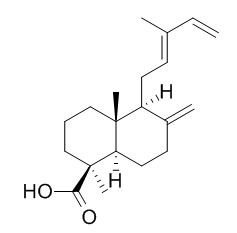Communic acid
Communic acid has antibacterial activity, including against mycobacterial. trans-Communic acid has potential to be utilized as anti-wrinkling agents and cosmetic ingredients, as they suppress UVB-induced MMP-1 expression.
Inquire / Order:
manager@chemfaces.com
Technical Inquiries:
service@chemfaces.com
Tel:
+86-27-84237783
Fax:
+86-27-84254680
Address:
1 Building, No. 83, CheCheng Rd., Wuhan Economic and Technological Development Zone, Wuhan, Hubei 430056, PRC
Providing storage is as stated on the product vial and the vial is kept tightly sealed, the product can be stored for up to
24 months(2-8C).
Wherever possible, you should prepare and use solutions on the same day. However, if you need to make up stock solutions in advance, we recommend that you store the solution as aliquots in tightly sealed vials at -20C. Generally, these will be useable for up to two weeks. Before use, and prior to opening the vial we recommend that you allow your product to equilibrate to room temperature for at least 1 hour.
Need more advice on solubility, usage and handling? Please email to: service@chemfaces.com
The packaging of the product may have turned upside down during transportation, resulting in the natural compounds adhering to the neck or cap of the vial. take the vial out of its packaging and gently shake to let the compounds fall to the bottom of the vial. for liquid products, centrifuge at 200-500 RPM to gather the liquid at the bottom of the vial. try to avoid loss or contamination during handling.
LWT2020, 126:109313
BMC Complement Altern Med.2014, 14:352
Sustainability2021, 13(23),12981.
J Nutr Biochem.2022, 107:109064.
Eur J Pharmacol.2021, 899:174010.
RSC Advances2017, 86
Asian J Beauty Cosmetol2022, 20(2):183-191
Korean J. Medicinal Crop Sci.2021, 29(1):45-50.
Fitoterapia.2022, 157:105130.
Dis Markers.2022, 2022:2380879.
Related and Featured Products
PLoS One. 2015 Jun 11;10(6):e0128365.
Brown Pine Leaf Extract and Its Active Component Trans-Communic Acid Inhibit UVB-Induced MMP-1 Expression by Targeting PI3K.[Pubmed:
26066652]
METHODS AND RESULTS:
HPLC analysis revealed that the quantity of trans-Communic acid (TCA) and dehydroabietic acid (DAA) significantly increases when the pine leaf color changes from green to brown. BPLE and trans-Communic acid elicited reductions in UVB-induced MMP-1 mRNA expression and activator protein-1 (AP-1) transactivation by reducing DNA binding activity of phospho-c-Jun, c-fos and Fra-1. BPLE and trans-Communic acid also inhibited UVB-induced Akt phosphorylation, but not mitogen activated protein kinase (MAPK), known regulators of AP-1 transactivation. We additionally found that BPLE and trans-Communic acid inhibited phosphoinositide 3-kinase (PI3K), the upstream kinase of Akt, in vitro. In summary, both BPLE and its active component trans-Communic acid exhibit protective effects against UVB-induced skin aging.
CONCLUSIONS:
Taken together, these findings underline the potential for BPLE and trans-Communic acid to be utilized as anti-wrinkling agents and cosmetic ingredients, as they suppress UVB-induced MMP-1 expression.
J Ethnopharmacol. 2012 Sep 28;143(2):695-700.
Anti-mycobacterial natural products from the Canadian medicinal plant Juniperus communis.[Pubmed:
22877928]
Common juniper, Juniperus communis, is amongst the plants most frequently used by the indigenous peoples of North America for medicinal purposes. The First Nations of the Canadian Maritimes use infusions of juniper primarily as a tonic and for the treatment of tuberculosis. Previous investigations of extracts derived from the aerial parts of J. communis have shown it to possess anti-mycobacterial activity. The aim of the study is to isolate and identify anti-mycobacterial constituents from the aerial parts of J. communis.
METHODS AND RESULTS:
Methanolic extracts of J. communis needles and branches were subjected to bioassay guided fractionation using the microplate resazurin assay (MRA) to assess inhibitory activity against Mycobacterium tuberculosis strain H37Ra. The anti-mycobacterial constituents were identified by NMR, MS and polarimetry.The diterpenes isocupressic acid and Communic acid and the aryltetralin lignan deoxypodophyllotoxin were isolated from the J. communis extract. Isocupressic acid and Communic acid (isolated as an inseparable 3:2 mixture of cis and trans isomers) displayed MICs of 78 μM and 31 μM and IC(50)s of 46 μM and 15 μM against M. tuberculosis H37Ra respectively. Deoxypodophyllotoxin was less active, with a MIC of 1004 μM and an IC(50) of 287 μM.
CONCLUSIONS:
Isocupressic acid, Communic acid and deoxypodophyllotoxin were identified as the principal constituents responsible for the anti-mycobacterial activity of the aerial parts of J. communis. Although further research will be required to evaluate the relative activities of the two Communic acid isomers, this work validates an ethnopharmacological use of this plant by Canadian First Nations and Native American communities.
Phytother Res. 2008 Dec;22(12):1570-6.
Antiparasitic, nematicidal and antifouling constituents from Juniperus berries.[Pubmed:
19067375]
METHODS AND RESULTS:
A bioassay-guided fractionation of Juniperus procera berries yielded antiparasitic, nematicidal and antifouling constituents, including a wide range of known abietane, pimarane and labdane diterpenes. Among these, abieta-7,13-diene (1) demonstrated in vitro antimalarial activity against Plasmodium falciparum D6 and W2 strains (IC(50) = 1.9 and 2.0 microg/mL, respectively), while totarol (6), ferruginol (7) and 7beta-hydroxyabieta-8,13-diene-11,12-dione (8) inhibited Leishmania donovani promastigotes with IC(50) values of 3.5-4.6 microg/mL. In addition, totarol demonstrated nematicidal and antifouling activities against Caenorhabditis elegans and Artemia salina at a concentration of 80 microg/mL and 1 microg/mL, respectively. The resinous exudate of J. virginiana afforded known antibacterial E-Communic acid (4) and 4-epi-abietic acid (5), while the volatile oil from its trunk wood revealed large quantities of cedrol (9).
CONCLUSIONS:
Using GC/MS, the two known abietanes totarol (6) and ferruginol (7) were identified from the berries of J. procera, J. excelsa and J. phoenicea.



